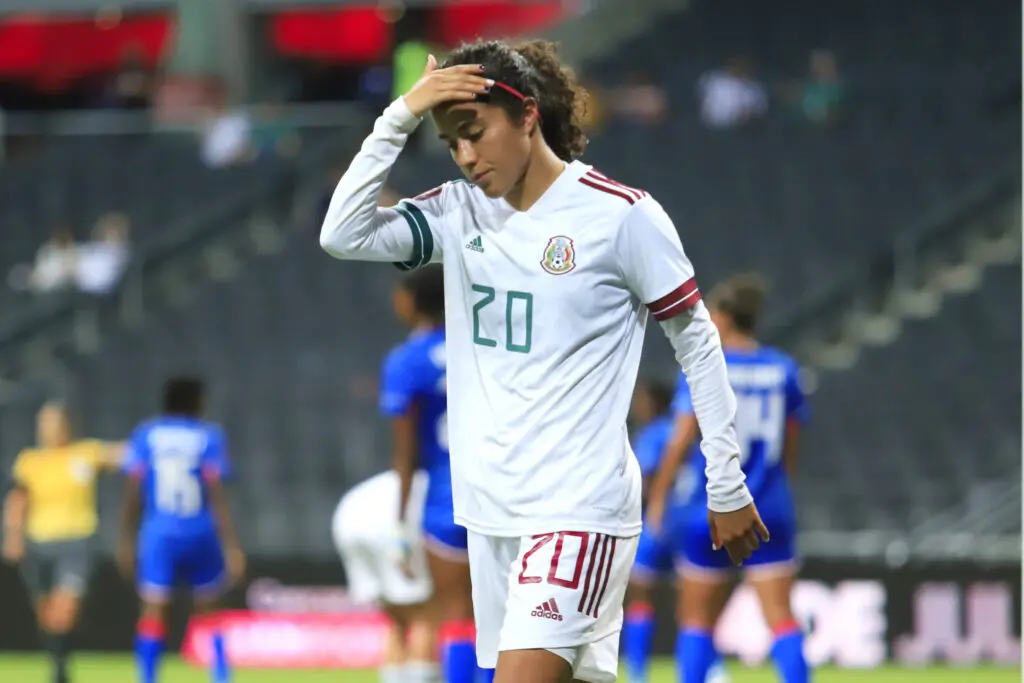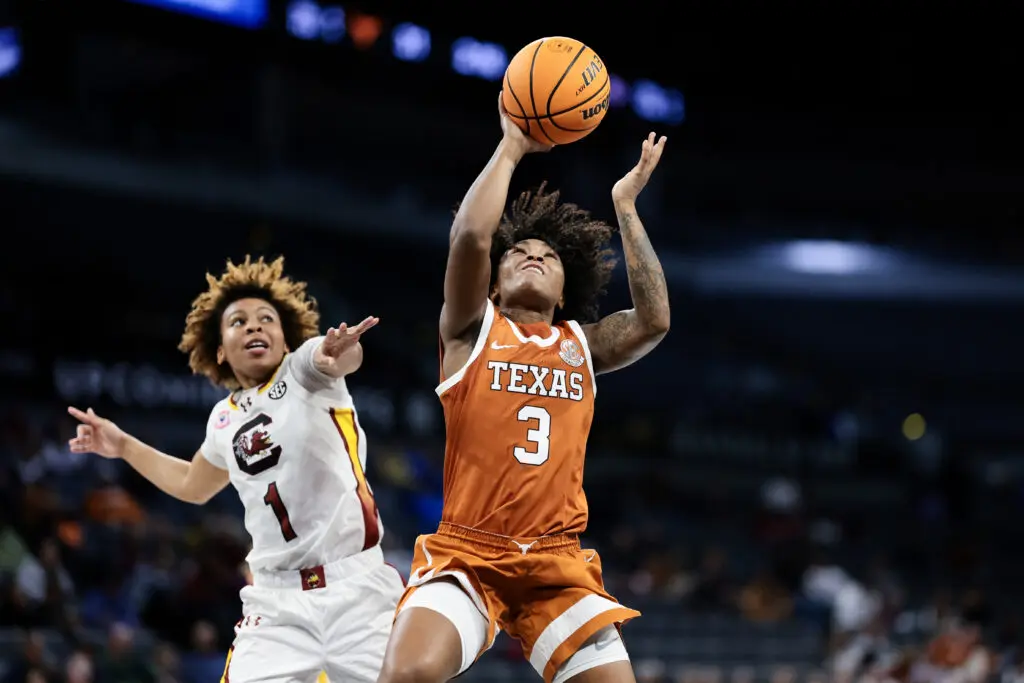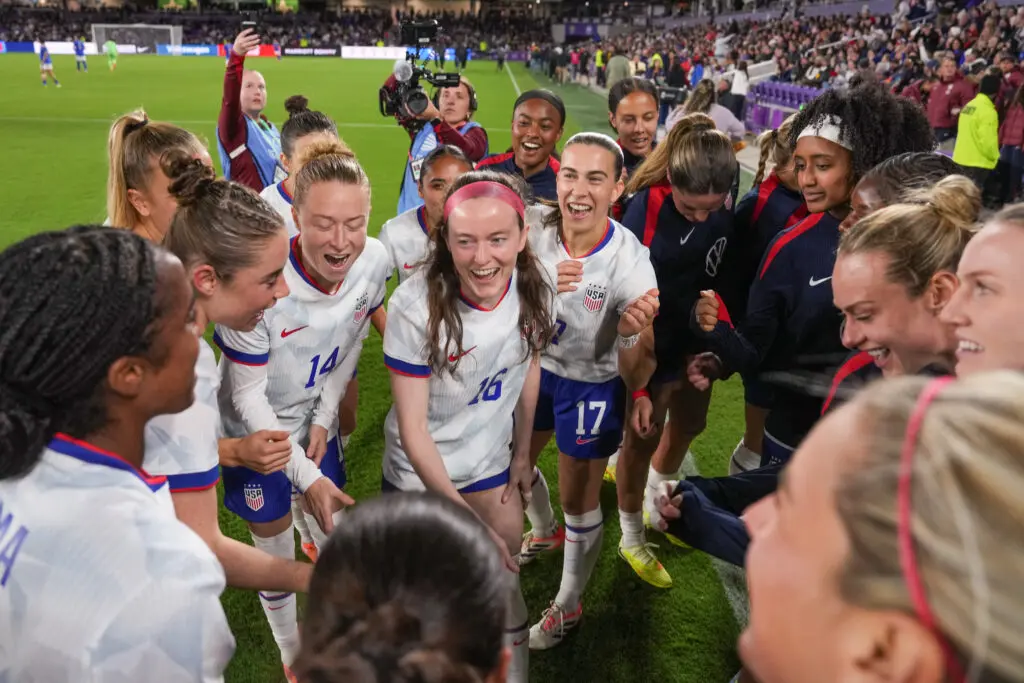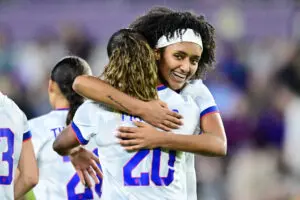When the final Concacaf W draw in April set the groups of the last round of the tournament, all eyes eventually landed on Group A. As unlikely as it is to have a “Group of Death” in a two-group format, Jamaica, Mexico and Haiti would have to compete against each other and the U.S. for two automatic qualification spots to the 2023 World Cup in Australia and New Zealand.
As May and June passed, and the USWNT lost key players to injury while Mexico blew through much of its competition, anticipation for a group stage upset grew. Adding to the intrigue, the games were to be played in Monterrey, Mexico — a more hostile qualifying environment for the World No. 1 team than they’d seen in years.
The USWNT and Mexico, historically, haven’t been pitted in the type of rivalry we’ve seen on the men’s side, but this year seemed to be trending toward an inflection point that could set a new tone between the two programs.
What actually occurred over the last week didn’t quite meet that expected, giving us a glimpse into a region that hasn’t changed in the ways we projected. A 1-0 loss to Jamaica last Monday set them on the wrong path, and a 3-0 loss to Haiti on Thursday has pushed them to the brink of the unthinkable.
Mexico will need all three points against the USWNT on Monday night to even have a shot at the inter-continental playoff spot given to Group A’s third-place finisher.
In addition to Haiti’s big step forward, the shock in the standings comes from all the progress Mexico had made in recent years to prepare for this exact moment. In 2016, the country founded Liga MX Femenil with the intention of developing domestic talent into a formidable national team that can represent Concacaf on the biggest stages. In 2018, Mexico failed to qualify for the three available spots for the 2019 World Cup, most notably falling 2-0 to eventual inter-continental playoff team Panama.
That failure devastated fans and players alike, but belief in the process kept the team pushing forward. The Mexican Football Federation identified that the future lay in the strength of the next generation, and after strong performances as the coach of the U-17 and U-20 ranks, former player Monica Vergara was named first-team manager in January 2021.
Vergara’s tenure up until a week ago had been considered a great success. She had identified talent both in Liga MX Femenil and abroad, and she had created a free-flowing attack that scored goals with ease. She also appeared to instill a belief into the player pool that they could compete with anyone, as evidenced in the team’s two results against Olympic gold medalists Canada at home last November.
Mexico advanced through the newly established Concacaf W preliminary rounds in completely dominant fashion and entered the final stage of the tournament on a 10-game winning streak, having scored 52 goals in that span.

So, when Vergara told the media before Mexico’s first match against Jamaica that they were “going to see a Mexico that they’ve never seen before,” there was reason to believe she was right. In reality, the game felt more haunted by the team’s 2018 failure than the clean slate they had been building toward. Vergara changed her starters against Jamaica, presenting a lineup that prioritized emerging talent without the benefit of experience. Even before the first whistle, the selection changes at the last minute undermined the idea that Mexico felt secure going into the biggest games of the qualifying cycle.
On the field, the team played with a similar aimlessness, as an early goal by Jamaica’s Khadija Shaw left Mexico scrambling for an equalizer. El Tri Femenil sent cross after hopeful cross into the box, rendering the attack both endless and predictable. Against Haiti, belief began to wane as they gave up two penalties and one exceptional free kick. While goals against are expected in tournaments like Concacaf W, Mexico’s lack of attacking bite sunk them before they could even get a foothold in the competition. The team enters Monday’s game still looking for its first goal.
They also didn’t benefit from a dip in the USWNT’s form. In a cruel twist of expectations, the young and relatively un-capped U.S. team has looked as relaxed and confident as they would on home soil.
Some of the tightness the USWNT showed in the Haiti match gave way to flexibility and freedom against a tired Jamaica side, with Sophia Smith scoring one of the best goals in the tournament just four minutes into the game. Jamaica couldn’t match their energy from Game 1 against the world champions, and the USWNT ran away with a 5-0 win while rotating lineups. They clinched a World Cup berth later that day after Mexico fell to Haiti.
The first of the evening for @sophsssmith ☝️
— U.S. Soccer WNT (@USWNT) July 7, 2022
pic.twitter.com/zpc4TQk8Oi
This USWNT qualifying squad is a far cry from the roster we saw in France in 2019, and it’s also not the exact team we’re going to see in 2023, but their ability to slot new players in has been a quiet strength of the group.
Vlatko Andonovski’s roster selection came under a fair amount of criticism, with creative attacking midfielders coming at the expense of the defensive midfield. As the Tokyo Olympics made clear, Lindsey Horan is not a long-term solution at the No. 6 and Andi Sullivan hasn’t been able to carry heavy minutes for the team in some time. Losing two starting center backs also raised red flags, as the U.S. depth was clearly going to be tested throughout the tournament.
Those deficiencies, however, didn’t sink the team in their first game, and in their second, they firmly overcame them. Naomi Girma looked just as calm and collected as advertised in her third cap against Jamaica. In fact, the NWSL rookie’s vision in distribution opened the field up for Smith’s first goal. And as the USWNT took a 2-0 lead within the first 10 minutes, any hope for another Jamaica upset seemed to fade.
The storylines all lead to Monday, when instead of granting a World Cup berth, the Mexico-U.S. match might follow old patterns instead. The USWNT does not want to meet Canada in the semifinals, and will do everything it can to get all nine points and set up a likelier meeting with Costa Rica. They’re also in the home stretch of the competition, meaning that they’re less likely to rotate within games as they aim for the tournament’s single-guaranteed 2024 Olympic spot.
For Mexico, the work put into the last four years should have meant that this game against the U.S. was an opportunity, and not an ultimatum. They’ve been bested by two good teams — Jamaica is the region’s established third-best squad with a very good new coach, and Haiti is bursting with young talent — and such is the injustice of the tournament’s draw. But they’re now fighting off the inevitability of defeat and, beyond that, an uncertain future.
After their appearance in the 2015 World Cup, Mexico bought into investment patterns within women’s world football that are supposed to work after a number of years. U.S. Soccer created the NWSL to establish a solid pipeline to the first-team USWNT, and the Americans have won two World Cups within the 10 years of the league’s existence. Across the world, club dominance has since translated to strong national team presences, as the emergence of Spain, France, and England in this year’s Euros can attest.

History tells us that, eventually, Mexico’s investment in its own domestic league will pay dividends on the international stage.
Whether Mexico walks away with the result necessary to have a chance at the next World Cup or not, those in leadership should understand that this tournament is simply a reflection of how difficult the climb can be. Liga MX Femenil is an increasingly competitive market for top players, Mexican stars are doing well in other leagues, and the national team’s future remains bright even if this cycle goes sideways.
From there, a rivalry against the U.S. remains an achievable — if not delayed — dream. Diana Ordoñez and María Sánchez are establishing themselves in the NWSL, and Liga MX Femenil has already attracted top USWNT prospect Mia Fishel.
Regardless of other results, Mexico can take a big step toward its long-term goals with a win Monday night. If you’re a believer in a healthy Concacaf region, you might in fact be rooting for it.
Claire Watkins is a contributing writer at Just Women’s Sports covering soccer and the NWSL. Follow her on Twitter @ScoutRipley.









